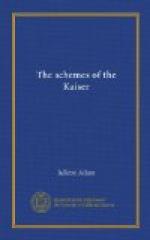The mania for autocracy dominates the mind of the German Emperor, King of Prussia, and leaves no room therein for anything but exactions of a disturbing kind. We know how numerous are the crimes of lese-majeste; also that William II wishes the Reichstag to pass a law punishing with hard labour those who incite strikes. A lecturer at the University of Berlin, M. Arons, having dared to proclaim himself a socialist—needless to say, from the theoretical point of view—the Emperor required his Minister of Public Education to have M. Arons brought for trial before the Council of the University, consisting of forty-five professors. These acquitted the accused, who, in their opinion, had not indulged in any propaganda and was within his strict rights in expressing his personal opinions. The Emperor had their judgment heard on appeal before a court consisting of officials of the Public Education Department. To make such an appeal possible, the Reichstag was required to pass a new law in June 1898, known as the Arons Law.
Whenever the occasion offered, I have shown how deep is the hatred which William II bears towards the old liberalism of the German Universities. Yet it is for this same William that certain Germanophils amongst our French Universities entertain such a disgraceful weakness. Whilst French newspapers are continually discussing, with evident sympathy, the possibility of the Kaiser’s paying a visit to France during the Exhibition, it brings the tears to our eyes to read the following in the Journal de Colmar:—
“The possibility of a rapprochement between Frenchmen and Germans should not lead the latter to suppose that the Alsatians are likely to forget their country in order to be reconciled with the conquerors. The Alsatian will never give up his own individual character, he will never lightly consent to be merged in a homogeneous whole. The Alsatian remains French, and such is the rigour of his nationality that it has resisted every attempt to destroy it.”
In order to make us believe the more easily that a reconciliation with Germany is possible, and that we may come to forget 1870 and the loss of Alsace-Lorraine, they are continually telling us that Germany has never been on better terms with Russia. I showed in my last letter what were the steps taken by the Germans to minimise the great, imperishable, humanitarian success of Tzar Nicholas II in bringing about the Hague Conference. I showed that his efforts resulted in leading all the diplomats accredited to the Peace Congress to recognise that the foundation had been laid, not only of the possibility of eliminating needless horrors from the wars of the future, but also of action by the Powers in common, to be brought to bear, in the form of advice and arbitration proposals, on the minds of rivals, adversaries and enemies preparing to settle their quarrels by the arbitrament of war.
Germany realises the defeat at the Hague so completely that now she thinks only of new armaments and of arming Turkey, her only ally, to the teeth. Herein she finds numerous advantages; such as supplying rifles and guns, sending out new military instructors, and threatening Russia with a formidable army commanded by German generals.




